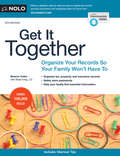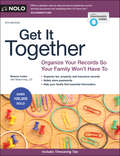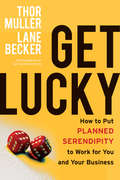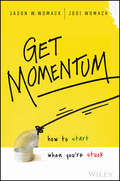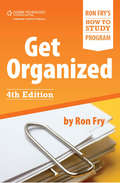- Table View
- List View
Get It Together: Organize Your Records So Your Family Won't Have To
by Melanie Cullen Shae IrvingGet your life organized with the best workbook available! Paperwork, personal information, and passwords aren't always easy to find, and organizing your records can seem like an intimidating task. But, whether you need to get a handle on records for yourself, your family or your executor, Get It Together will show you how to organize: instructions for survivors secured places and passwords estate planning documents funeral arrangements employment records insurance policies tax records retirement accounts government benefits real estate records and more. For those concerned about sensitive information like passwords, Get It Together lets you: Securely store an unlimited number of passwords while keeping them handy. Decide whether you want to record your information electronically or by hand. Choose the way you want to organize your passwords--for example, alphabetically or by type of product or service. Easily add related notes, such as security questions. This workbook provides a complete system for structuring and organizing your information and documents into a records binder. For each topic, you will find helpful content, rich resources and step-by-step instructions. All forms are downloadable through a link printed in the book.
Get It Together: Organize Your Records So Your Family Won't Have To
by Melanie Cullen Shae IrvingGet It Together is a detailed workbook that helps you collect and organize your important papers and information. The author leads you through the process step-by-step, prompting you to find and keep track of: secured places and passwords employment records insurance policies real estate records tax records retirement accounts estate planning documents final arrangements letters to loved ones, and more. The end product will be an important and useful gift to those who wrap up your affairs after your death. Now available a companion Binder & Tab Set - search for "get it together binder and tab set"
Get It Together: Organize Your Records So Your Family Won't Have To
by Melanie Cullen Shae IrvingEverything you need to get organized Do your loved ones know where to find your life insurance policies, online banking passwords, real estate deeds, or even your will? If you’re like a lot of people, you keep important information—from the whereabouts of family heirlooms to online passwords to automatic bill-pay details—in your head or stashed in the odd desk drawer. Unfortunately, this disorganization will likely cause hassles for those who someday take care of you or your estate. Get It Together provides an easy, straightforward method to help you and others keep track of: secured places and passwords employment records insurance policies real estate records tax records retirement accounts estate planning documents funeral arrangements letters to loved ones We’ve reorganized this 9th edition to make the process more straightforward. In the first half, you’ll find the pages to create your personal planner. In the second half, you’ll find step-by-step instructions and helpful resources. With downloadable forms: organize your records using worksheets (details inside). Save the worksheets to your computer and then complete, print, and store them at your convenience.
Get It Together
by Shae Irving Melanie CullenGet your life organized with the best workbook available! Paperwork and personal information isn't always easy to find, and organizing your records can seem like an intimidating task. But, whether you need to organize records for yourself, your family or your executor, Get It Together will show you how to keep track of: instructions for survivors secured places and passwords final arrangements estate planning documents employment records insurance policies tax records retirement accounts government benefits, and real estate records. This workbook provides a complete system for structuring a records binder and easily organizing it for your loved ones. This edition is easier to use than ever, with fully updated resources and references. All forms are now downloadable at nolo.com.
Get The Job You Really Want
by James Caan"It is possible to have the job of your dreams. Together we are going to set about getting you there.Before I joined the BBC's Dragons' Den, I spent thirty years setting up and running recruitment companies, placing hundreds of thousands of candidates in the jobs they really wanted.I will take you through the process step by step. How to stay positive in a difficult economic climate and find the right opportunities. How to package yourself to make sure you secure an interview. The vital importance of preparation, so that you are relaxed and give a great performance at interview. How to show your passion, and ask the perfect questions. And finally, how to use your power by closing the best deal on a job offer.At every stage I will help you rethink the traditional, formulaic approach to job hunting. It's the detail that makes the difference.This book is not about hoping you get lucky. It is about creating your own luck."James Caan
Get The Job You Want, Even When No One's Hiring
by Ford R. MyersGet the Job You Want, Even When No One's HiringYou CAN find a good job in a bad economy - but NOT with conventional search strategies.New Rules for a New RealityToday's job market is the toughest in recent history, and the challenges are here to stay. Even so, you CAN get the job you want - IF you discard conventional approaches to the search. Get the Job You Want, Even When No One's Hiring is the ONLY career book that:Explains the special strategies necessary to land a job during an economic crisisIntegrates comprehensive, practical guidance on both job search and career managementProvides an extensive online "Job Search Survival Toolkit" to augment the book Addresses the realities of this job market with real-world, actionable stepsPositions this downturn in the economy as a positive opportunity to develop a much better careerIn Get the Job You Want, Even When No One's Hiring, career expert Ford R. Myers maps the new world of job search and reveals essential strategies for your success. You'll learn how to seize opportunities that aren't posted yet ... how to make yourself an instant asset to potential employers ... how to clearly stand-out as the best candidate ... and how to leverage social media, blogs, and other Web tools.Best of all, you'll learn how to "recession-proof" your career for the long term. Can YOU Get the Job You Want, Even When No One's Hiring? With this powerful new book - YES, you can!
Get Lean: 5 Ways to Cut Costs Now by Greening Your Business
by Andrew WinstonIn tough times, the mandate for companies becomes "use less, save money." Even the leanest companies must find new ways to slash costs quickly. So what can you and your organization change within months that will pay back in the short-term? In this chapter, author Andrew Winston describes how green initiatives that save energy and other resources can save your company serious money that falls quickly to the bottom line. He outlines five areas of the business where green thinking will generate savings fast. This chapter was originally published as chapter 2 of "Green Recovery: Get Lean, Get Smart, and Emerge from the Downturn On Top."
Get Lucky
by Thor Muller Lane BeckerA guide to getting luck on your sideAs the pace of change accelerates and the volume of information explodes, we're under great pressure to connect just in time with the people and ideas we need to thrive. But we can no longer plan our way to success--there will always be factors beyond our control. This uncertainty, however, cultivates one of today's key drivers of success: serendipity. More than blind luck, serendipity can produce quantifiable results: breakthrough ideas, relationships that matter, effortless cooperation, synchronized market timing, and more. Get Lucky shows businesses how to succeed by fostering the conditions for serendipity to occur early and often. Distills planned serendipity into eight key elements: preparedness, motion, activation, attraction, connection, commitment, porosity, and divergenceFeatures stories of serendipity in action at well-known companies including Avon, Target, Steelcase, Google, Facebook, Walmart, and moreWritten by serial entrepreneurs and cofounders of Get Satisfaction, a breakout platform for online customer service communities with over 100,000 clientsPlanned serendipity is not an abstract, magical notion, but a practical skill. Get Lucky is the indispensable resource for anyone who wants to learn this skill and to make serendipity work for them.
Get Momentum: How to Start When You're Stuck
by Jason W. Womack Jodi WomackA powerful and personalized process to improve your life and advance your career Do you sometimes feel stuck, despite real efforts to gain momentum on goals you've set? Momentum means you're doing more than simply getting things done. It's that feeling of satisfaction, the belief that you can achieve big goals and complete important projects that fulfill you both personally and professionally. Get Momentum coaches you in the mindset, skill set, and toolkit required to make progress on the items you have on your life and work goals faster and easier, while living a less stressful, more meaningful life. The authors, Jodi Womack and her husband Jason Womack, provide valuable insights into the psychology of change and how to direct your focus to experience fulfillment at work and in life. The authors share what they know having built a successful executive coaching firm together, as well as facilitating leadership workshops in their home town and more than twenty countries around the world. Contrary to the promise of many self-help/business books, they believe there is no one-size-fits-all recipe for success.Get Momentum teaches you how to make proactive changes based on the solid foundation of your own "quality of life" criteria. Jodi and Jason offer clear, step-by-step guidance on how to define your personal criteria so that you can Get Momentum, improve your life and enhance your career. You will learn how to: Answer the Call (What to do when you say "Someone should do something about this!") Organize a Team and Gain the Perspective of People You Trust Measure Something (Just Not Everything At Once) Experiment Specifically and Practice Deliberately Build Momentum, Recognize Your Wins, and Pay It Forward With kindness, accountability and encouragement, Get Momentum will help you tap into your natural way of being to achieve professional goals and personal experiences that are on your bucket list, living a life you're proud to share with others.
Get Money: Live the Life You Want, Not Just the Life You Can Afford
by Kristin Wong<p>Learn how to live the life you want, not just the life you can afford in this highly engaging, step-by-step guide to winning at personal finance! <p>Managing your money is like going to the dentist or standing in line at the DMV. Nobody wants to do it, but at some point, it's inevitable: you need to clean your teeth, renew your license, and manage your personal finances like a grown-up. Whether you're struggling to pay off student loan debt, ready to stop living paycheck to paycheck, or have finally accepted that your Beanie Baby collection will never pay off, tackling your finances may seem immensely intimidating. But it doesn't have to be. In fact, by approaching it as a game--or something that requires you to set clear goals, as well as face challenges you must "beat"--personal finance can not only be easy to understand, but it can also be fun! <p>In <i>Get Money</i>, personal finance expert Kristin Wong shows you the exact steps to getting more money in your pocket without letting it rule your life. Through a series of challenges designed to boost your personal finance I.Q., interviews with other leading financial experts, and exercises tailored to help you achieve even your biggest goals, you'll learn valuable skills such as: <p> <li>Building a budget that (gasp) actually works <li>Super-charging a debt payoff plan <li>How to strategically hack your credit score <li>Negotiating like a shark (or at least a piranha) <li>Side-hustling to speed up your money goals <li>Starting a lazy investment portfolio...and many more!</li> <p> <p>Simply put, with this gamified guide to personal finance, you'll no longer stress about understanding how your finances work--you'll finally "get" money.</p>
Get Motivated! Overcome Any Obstacle, Achieve Any Goal, and Accelerate Your Success with Motivational DNA
by Tamara LoweNew York Times and Wall Street Journal Bestseller. Motivated people advance further and faster in their careers, earn more money, are more productive, experience more satisfying relationships and are happier than the less-motivated people around them. But true motivation cannot be faked or forced. In the same way that each person has a different fingerprint and a distinct combination of DNA, every individual is hardwired with a unique motivational matrix. Grounded in eight years of research with more than 10,000 people, this book reveals how to decode your Motivational DNA for maximum achievement. Whether you are an individual seeking to realize your personal goals or a leader looking to motivate your team, Get Motivated! will show you how to overcome any obstacle, achieve any goal, and accelerate your success. For more than twenty years motivational expert Tamara Lowe has produced the largest business seminars in the world, inspiring peak performance in millions. In GET MOTIVATED! she unveils a new system that shows you: * How to Decode Your Motivational DNA * How to Hire the Motivated and Motivate Those You've Hired * Easy Ways to Deal with Difficult People * The Formula for Beating Stress While Meeting Deadlines * How to Raise Positive, Self-Motivated Children * How to Kick Your Team's Performance and Your Profits into High Gear.
Get Off My Neck: Black Lives, White Justice, and a Former Prosecutor's Quest for Reform
by Debbie HinesA deeply revealing exposé of the American prosecutorial system and its historic and present racial inequities—and how we can transform the system to one of fairness and justice.In Get Off My Neck, Debbie Hines draws on her unique perspective as a trial lawyer, former Baltimore prosecutor, and assistant attorney general for the State of Maryland to argue that US prosecutors, as the most powerful players in the criminal justice system, systematically target and criminalize Black people. Hines describes her disillusionment as a young Black woman who initially entered the profession with the goal of helping victims of crimes, only to discover herself aiding and abetting a system that prizes plea bargaining, speedy conviction, and excessive punishment above all else. In this book, she offers concrete, specific, and hopeful solutions for just how we can come together in a common purpose for criminal justice and racial justice reform.Get Off My Neck explains that the racial inequities in the prosecutorial system are built into our country&’s DNA. What&’s more, they are the direct result of a history that has conditioned Americans to perceive the Black body as insignificant at best and dangerous at worst. Unlike other books that discuss the prosecutor&’s office and change from inside the office, Hines offers a proactive approach to fixing our broken prosecutorial system through a broad-based alliance of reform-minded prosecutors, activists, allies, communities, and racial justice organizations—all working together to end the racist treatment of Black people.Told intimately through personal, family, and client narratives, Get Off My Neck is not only a deeply sobering account of our criminal justice system and its devastating impact on Black children, youth, and adults but also a practical and inspiring roadmap for how we can start doing better right now.
Get on the Balcony (Why Leaders Need to Step Back to Get Perspective)
by Ronald A. Heifetz Marty LinskyIn order to remain effective when under attack, a leader must be able to get some distance from the challenging situation in order to gain perspective. The authors refer to this practice as "going to the balcony" in order to see the bigger picture and possibly break the spell of groupthink or temporary hysteria that prevails on the ground. This chapter uses several examples of the ways in which leaders can effectively use the balcony. This chapter was originally published as Chapter 3 of "Leadership on the Line."
Get Organized: Second Edition
by Ron FryGet Organized can help you accomplish more in less time. The book presents simple time-management techniques that can make a big difference in your effectiveness. By deciding what is important and what isn't...by avoiding time traps...and by getting in the habit of developing to-do lists, daily schedules, monthly calendars, and project boards, readers learn how to make the most of their study time. They'll be studying smarter, not harder.
Get Organized
by Ron FryGet Organized shows you how to create your ideal study environment by using simple time-management tips to develop to-do lists, daily schedules, monthly calendars, and project boards. Now updated to include electronic and online planning tools, this new edition also provides strategies that help you prioritize, avoid time trap activities, and anticipate opportunities. You'll learn how to make your study time efficient and effective.
Get Organized (Ron Fry's How to Study Program #2)
by Ron FryTake the stress out of studying with this students’ guide to time management and organization from the bestselling How to Study series. In this essential guide, education expert Ron Fry helps students of all ages develop organizational techniques, streamline study time, and avoid the stress of disorderly spaces and rushed schedules. Get Organized also provides strategies for prioritizing tasks, avoiding time-trap activities and procrastination, and anticipating opportunities. You’ll learn how to make your study time efficient and effective by using simple time-management tips that are practical, flexible, and adaptable for your personal goals. Get Organized features: Updated information on electronic and online planning toolsTips for creating ideal study environmentsProven techniques for establishing effective lifelong organizational habitsAdvice on making monthly and daily calendars work for youIdeas for creating optimal project boards and to-do listsPrepare. Prioritize. Plan. Whatever your age, you can benefit from the smart strategies in Get Organized.
Get Out of Debt! Book Four: Putting Your Financial Life Back Together
by David RyeAs tens of millions of people have discovered, debt can be a crushing burden. It can tear down dreams and destroy lives. But debt can be avoided. With fiscal discipline and a clear plan, anyone can get out of debt and live debt-free.In the easy-to-read, accessible style of the Get Out of Debt! series, authors David and Marcia Rye explain how to:Assess debt problemsUse home equity to get rid of debtCut college expensesLive within a budgetUnderstand bankruptcy lawStay out of debtNo one has to live in the shadow of financial insecurity any longer. When the economy takes a turn for the worse, it's essential to get out of debt. With this series at your side, you’ll conquer debt and secure the financial future you deserve!Be sure to get all four books in the Get Out of Debt! series.
Get Out of Debt! Book Four
by David Rye Marcia RyeAs tens of millions of people have discovered, debt can be a crushing burden. It can tear down dreams and destroy lives. But debt can be avoided. With fiscal discipline and a clear plan, anyone can get out of debt and live debt-free.In the easy-to-read, accessible style of the Get Out of Debt! series, authors David and Marcia Rye explain how to:Assess debt problemsUse home equity to get rid of debtCut college expensesLive within a budgetUnderstand bankruptcy lawStay out of debtNo one has to live in the shadow of financial insecurity any longer. When the economy takes a turn for the worse, it's essential to get out of debt. With this series at your side, you'll conquer debt and secure the financial future you deserve!Be sure to get all four books in the Get Out of Debt! series.
Get Out of Debt! Book Four: Putting Your Financial Life Back Together
by David Rye Marcia RyeAs tens of millions of people have discovered, debt can be a crushing burden. It can tear down dreams and destroy lives. But debt can be avoided. With fiscal discipline and a clear plan, anyone can get out of debt and live debt-free. In the easy-to-read, accessible style of the Get Out of Debt! series, authors David and Marcia Rye explain how to: Assess debt problems Use home equity to get rid of debt Cut college expenses Live within a budget Understand bankruptcy law Stay out of debt No one has to live in the shadow of financial insecurity any longer. When the economy takes a turn for the worse, it's essential to get out of debt. With this series at your side, you'll conquer debt and secure the financial future you deserve! Be sure to get all four books in the Get Out of Debt! series.
Get Out of Debt! Book One: Dealing with Challenges of Debt
by David RyeAs tens of millions of people have discovered, debt can be a crushing burden. It can tear down dreams and destroy lives. But debt can be avoided. With fiscal discipline and a clear plan, anyone can get out of debt and live debt-free.In the easy-to-read, accessible style of the Get Out of Debt! series, authors David and Marcia Rye explain how to:Assess debt problemsUse home equity to get rid of debtCut college expensesLive within a budgetUnderstand bankruptcy lawStay out of debtNo one has to live in the shadow of financial insecurity any longer. When the economy takes a turn for the worse, it's essential to get out of debt. With this series at your side, you’ll conquer debt and secure the financial future you deserve!Be sure to get all four books in the Get Out of Debt! series.
Get Out of Debt! Book One
by David Rye Marcia RyeAs tens of millions of people have discovered, debt can be a crushing burden. It can tear down dreams and destroy lives. But debt can be avoided. With fiscal discipline and a clear plan, anyone can get out of debt and live debt-free.In the easy-to-read, accessible style of the Get Out of Debt! series, authors David and Marcia Rye explain how to:Assess debt problemsUse home equity to get rid of debtCut college expensesLive within a budgetUnderstand bankruptcy lawStay out of debtNo one has to live in the shadow of financial insecurity any longer. When the economy takes a turn for the worse, it's essential to get out of debt. With this series at your side, you'll conquer debt and secure the financial future you deserve!Be sure to get all four books in the Get Out of Debt! series.
Get Out of Debt! Book One: Dealing with Challenges of Debt
by David Rye Marcia RyeAs tens of millions of people have discovered, debt can be a crushing burden. It can tear down dreams and destroy lives. But debt can be avoided. With fiscal discipline and a clear plan, anyone can get out of debt and live debt-free. In the easy-to-read, accessible style of the Get Out of Debt! series, authors David and Marcia Rye explain how to: Assess debt problems Use home equity to get rid of debt Cut college expenses Live within a budget Understand bankruptcy law Stay out of debt No one has to live in the shadow of financial insecurity any longer. When the economy takes a turn for the worse, it's essential to get out of debt. With this series at your side, you'll conquer debt and secure the financial future you deserve! Be sure to get all four books in the Get Out of Debt! series.
Get Out of Debt! Book Three: Improving Your Quality of Life
by David RyeAs tens of millions of people have discovered, debt can be a crushing burden. It can tear down dreams and destroy lives. But debt can be avoided. With fiscal discipline and a clear plan, anyone can get out of debt and live debt-free.In the easy-to-read, accessible style of the Get Out of Debt! series, authors David and Marcia Rye explain how to:Assess debt problemsUse home equity to get rid of debtCut college expensesLive within a budgetUnderstand bankruptcy lawStay out of debtNo one has to live in the shadow of financial insecurity any longer. When the economy takes a turn for the worse, it's essential to get out of debt. With this series at your side, you’ll conquer debt and secure the financial future you deserve!Be sure to get all four books in the Get Out of Debt! series.
Get Out of Debt! Book Three: Improving Your Quality of Life
by David Rye Marcia RyeAs tens of millions of people have discovered, debt can be a crushing burden. It can tear down dreams and destroy lives. But debt can be avoided. With fiscal discipline and a clear plan, anyone can get out of debt and live debt-free. In the easy-to-read, accessible style of the Get Out of Debt! series, authors David and Marcia Rye explain how to: Assess debt problems Use home equity to get rid of debt Cut college expenses Live within a budget Understand bankruptcy law Stay out of debt No one has to live in the shadow of financial insecurity any longer. When the economy takes a turn for the worse, it's essential to get out of debt. With this series at your side, you'll conquer debt and secure the financial future you deserve! Be sure to get all four books in the Get Out of Debt! series.
Get Out of Debt! Book Three
by Marcia Rye David RyeAs tens of millions of people have discovered, debt can be a crushing burden. It can tear down dreams and destroy lives. But debt can be avoided. With fiscal discipline and a clear plan, anyone can get out of debt and live debt-free.In the easy-to-read, accessible style of the Get Out of Debt! series, authors David and Marcia Rye explain how to:Assess debt problemsUse home equity to get rid of debtCut college expensesLive within a budgetUnderstand bankruptcy lawStay out of debtNo one has to live in the shadow of financial insecurity any longer. When the economy takes a turn for the worse, it's essential to get out of debt. With this series at your side, you'll conquer debt and secure the financial future you deserve!Be sure to get all four books in the Get Out of Debt! series.

